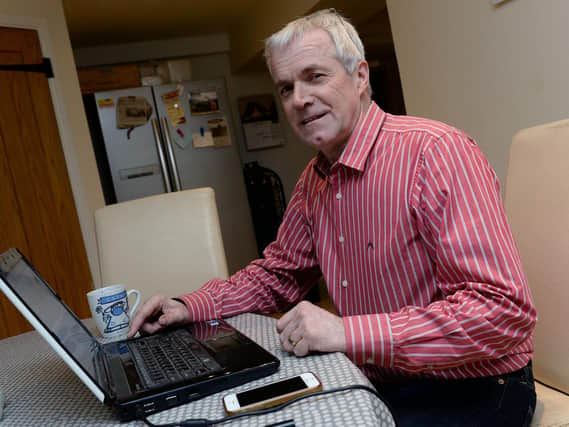Banburyshire Covid-19 survivor is one of the first in a trial donating plasma to help others beat the virus


Roger Bellamy 62, is one of the first donors of his plasma in an important trial in which Covid-19 sufferers are given the blood product to increase their chances of recovery.
So far Mr Bellamy has had three units taken, each 560ml, at donation sessions at the JR hospital, Oxford.
Advertisement
Hide AdAdvertisement
Hide Ad"Because they only take the plasma, you can donate every fortnight," he said. "It’s quite fascinating, really. They take the blood out, separate the plasma in a centrifuge and then return the red stuff to the donor. That way the body can replenish in a fortnight whereas whole blood needs a month.
"I gather the procedure now is to give it as an initial treatment as soon as a vulnerable patient is diagnosed. Each patient is generally given two units of the plasma so I have helped one and a half patients.The plasma can be frozen and also used in other treatments so even if coronavirus was to entirely fizzle out, the plasma would still be of use.
"I’d never given blood before and I was surprised how welcoming the staff were and to be honest it’s not an unpleasant experience. I was never sure I’d had the disease till I was tested as part of the CV Plasma Recovery programme," he said.
Mr Bellamy applied to join the trial and was involved in a telephone questionnaire.
Advertisement
Hide AdAdvertisement
Hide Ad"I heard nothing for five weeks and then I got the call and a first appointment where they took my medical details, passed the quite stringent tests to weed out potential HIV and Hepatitis carriers and I gave plasma. The acknowledgement I’d had CV and had a high antibody count came about ten days later. That was the back end of May."
Mr Bellamy encouraged others who have had the virus to donate their plasma. "After all, Covid-19 hasn’t gone away. They’re going to need every unit of plasma they can lay their hands on."
He contracted Covid-19 in late March. It started with an involuntary cough which lasted for a fortnight. This was followed by a cold which came in waves. His lungs were very sensitive to the cold air and he developed a very uncomfortable stomach.
"I had a slight fever, a nagging headache, loss of taste - I couldn't even taste salt - and began to get strange hallucinations. The illness came in waves, each one bringing the next component. I had freezing feet. It was the worst disease I've ever had and I've had some strange illnesses," he said.
Advertisement
Hide AdAdvertisement
Hide Ad"The whole thing lasted about a month. It takes some time to get over and you mustn't push yourself back into activity too soon. I know people who have relapsed. You need to be focused and mentally strong through it. You can't be passive with it."
According to the NHS Blood and Transfusion service plasma is a yellow-ish liquid in your blood that carries red and white blood cells and platelets around the body.
"After a virus, your plasma contains antibodies used to help fight infection. Convalescent plasma is the antibody-rich plasma of someone who has recovered from a virus, in this case COVID-19. This plasma can be transfused to patients whose immune systems are struggling to develop their own antibodies," the service says.
If you have recovered from coronavirus or have had symptoms and think you have had the virus and you would like to donate your plasma see here.